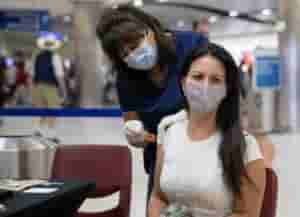COVID-19 vaccines are free and widely available in San Antonio, Texas, but only 57 percent of eligible Bexar County residents — people aged 12 and older — have been fully vaccinated. More than two-thirds of eligible residents have received at least one dose, the Texas Department of State Health Services said.
According to San Antonio health officials, there are at least 400,000 Bexar County residents who are eligible to receive the vaccine but haven’t. This number has worried experts as a third surge of COVID-19 patients, with the vast majority of them unvaccinated, threatens to overwhelm hospitals.
Some of the people in this population have given the top factors affecting their decision not to get vaccinated.
These factors are misinformation about the vaccine circulating on social media, the city’s long-standing socioeconomic inequities, the inability of the officials to mandate getting vaccinated, dealing with the potential side effects that could last for days after getting the shot, busy schedule, and fear that their employers will not give them the necessary time needed to get vaccinated and recover from it.
Dr. Anita Kurian, who manages the communicable disease division in the area, said: “What we are seeing at this time is a lot of vaccine hesitancy primarily stemming from mistrust and misinformation.”
One of the misinformation that is spreading about COVID-19 vaccines is that they are not free or that one must have health insurance to avail of the shot. Although vaccination sites ask for health insurance information from those who want to get vaccinated, they will not be turned away just because they are uninsured.
Others believe that if they are not properly documented and seek vaccination, they could be deported. District 4 Councilwoman Adriana Rocha Garcia said of this issue: “I just feel so strongly though that people are just afraid — not of the vaccine itself, not of the effects of the vaccine — but of the documentation, when, in reality, there’s very little documentation that goes into getting the vaccine.”

Some do not see the point of getting vaccinated because there is still the possibility of contracting the virus, regardless of the vaccination status. Amid the vaccine hesitancy among people, most of the Delta variant cases in the United States are affecting the unvaccinated population largely. Researches also show that if a vaccinated person gets COVID-19, the effects won’t be too severe compared to the unvaccinated.
As for the vaccine’s side effects, health officials said that it is true one could get a headache, fever, dizziness, or arm pain after the vaccination, but it would only last for two to three days. People should not believe the information circulating that the effects of the vaccine are the same as the effects of the disease itself. In line with this, officials want to debunk the spreading false information that the vaccines cause infertility and threat to a pregnant woman and her baby.
Many programs incentivizing those who get their shot have been rolled out to increase the number of people wanting to get vaccinated. The most common incentive is a gift card a person can use with partner establishments.


